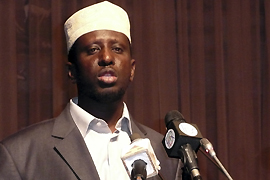Somali MPs to elect new president
Islamic Courts Union leader among favourites for post when voting takes in Djibouti.

| In depth |
  Timeline of Somalia Timeline of Somalia Restoring Somalia Restoring Somalia A long road to stability A long road to stability Profile: Sheikh Sharif Profile: Sheikh SharifSheikh Ahmed |
“My first priority is to bring peace to Somalia and I will serve the nation to the best of my ability,” Sheikh Sharif, who also heads the Islamic Courts Union which briefly controlled much of Somalia in 2006, said on Thursday.
The election is due to start at 12:00 GMT and through a series of ballots the candidates will be narrowed down to two for a final vote.
Under the constitutional charter, a new Somali president should be chosen by parliament within 30 days of the resignation of the former one, who resigned on December 29, 2008.
Opposition deal
The election on Friday comes two days after 200 members of the opposition ARS were sworn into parliament as part of an agreement brokered by the UN.
Another 75 seats are still to be filled by other opposition and civil society groups, as part of an effort to bring former opponents into the government.
 |
| Sheikh Sharif Sheikh Ahmed, chairman of the ARS, is a front-runner for president [Reuters] |
The parliament on Wednesday voted to extend by two years the transitional period of the government. Its original term of five years would have ended in seven months.
In the short term, the new president will have to deal with many armed opposition groups, including the al-Shabaab, who have seized control of much of south and central Somalia, as well as large areas of the capital of Mogadishu.
Al-Shabaab has vowed to carry on fighting and impose its interpretation of Islamic law throughout the country.
“Although there are strong expectations, we are all aware that years of war and violence, violations of human rights and corrupt practices will not disappear overnight,” Ahmedou Ould-Abdallah, the UN’s envoy, wrote in a letter to the Somali parliament.
“It is up to you, the fathers, mothers, brothers and sisters to prevail on your children, your young brothers and friends to stop the violence. For the last 20 years, it has not helped any group to win lasting victory,” he wrote.
Somalia has not had an effective central government since 1991, when Mohammed Siad Barre was forced from power.